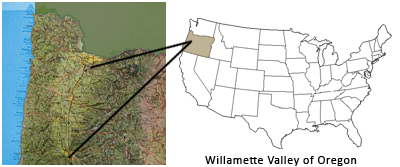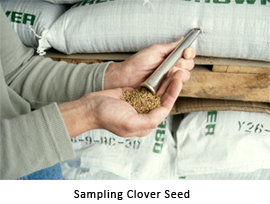Oregon-Grown Clover Seed
Oregon is the source of world class clover seed for pasture, cover crops or simply for beautification around the house.
- Attracts Beneficial Insects
- Reduced Animal Toxicities
- Healthier Soil
- Lower Nitrogen Fertilizer Costs

Oregon-Grown Clover SeedFor information on specific clovers, please see our Red Clover, Crimson Clover, White Clover, and Arrowleaf Clover pages. When it comes time to purchase your clover seed, we recommend Oregon Clover Seed for the highest quality product. Clover Seed Production in OregonSusan Aldrich-Markham, Former (Retired) Extension Agent, Field Crops - Download PDF The Willamette Valley of western Oregon is a premier seed production region, especially for clovers and cool-season grasses. Three things contribute to Oregon growers' ability to produce seed of the highest quality: expertise, climate, and infrastructure. The expertise comes from long experience. Many seed growers operate family farms that have been producing seed for four generations. 
What is unique about climate in the Willamette Valley is that it rarely rains in July and August, though total annual rainfall is more than 40 inches. This is an advantage for seed production. Seeds can be grown without irrigation, then dried in the field with little risk of being rained on. In addition to over 32,000 acres of clover seed, over 480,000 acres of grass seed are also grown in the Willamette Valley. A large industry infrastructure has developed, including transportation for selling seed across the United States and internationally. Many seed companies, with state-of-the-art seed cleaning plants, are located in the area. 
An important part of the seed industry infrastructure includes the Seed Certification program handled by Oregon State University. A blue Certified Seed tag guarantees that the seed is the genetically pure variety listed on the tag and that it has met high quality standards. A field in the certification program field is inspected at least once in the seedling stage and again each year prior to harvest. The seed must be sampled and tested through the OSU Seed Laboratory. The clover seeds grown in Oregon are primarily red, crimson, arrowleaf, and white or Ladino. Red, crimson, and arrowleaf clover seed is grown mostly in the north valley (Washington, Yamhill, and Polk counties). White clover seed is grown in the south valley (Linn County). About 2,000 acres of red, crimson, and arrowleaf clovers for seed are grown under irrigation in other areas of Oregon. Minor-Crop Issues:One of the greatest challenges clover seed growers face is the fact that clovers are minor crops. Often, agricultural supply companies are not willing to invest money into the research required to obtain pesticide registrations for minor crops because they do not see much potential profit. Growers therefore have limited options for pest control. It is critical for a seed field to be kept free of weeds, because a weed could become a problem in a new area if its' seeds were planted with the crop seed. For this reason, keeping fields clean is a costly part of seed production. Growers utilize registered herbicides, but they may also need to control weeds using hand labor. Clover growers, through the Oregon Clover Commission, have negotiated with some agricultural supply companies to support 24c or Special Local Needs (SLN) registrations, with the research funded by the growers themselves. There are several current SLN pesticide registrations in Oregon for clover grown for seed. Many of the labels specify that treated foliage and seed screenings cannot be fed to livestock. The Oregon Clover Commission is currently funding efficacy and residue trials for possible registration of more pesticides. |
Quick Links |
Copyright © 2018 - All Rights Reserved